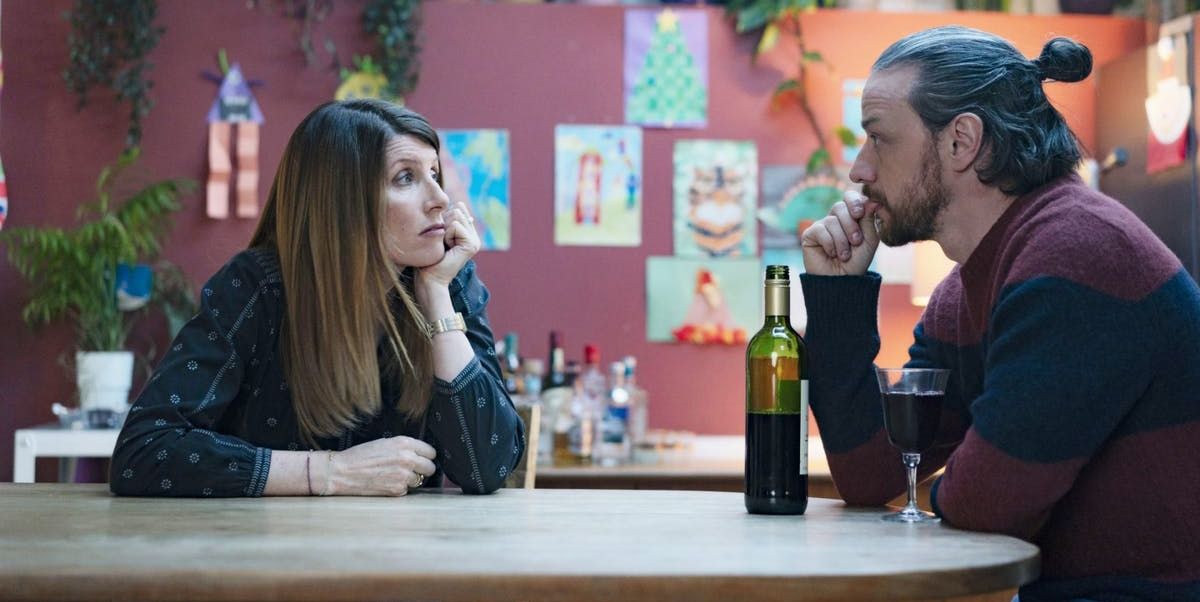Click here for the flashback interview with James McAvoy and Joe Wright for ATONEMENT.
Years from now, Dennis Kelly’s TOGETHER will be an integral part of future generations understanding the zeitgeist of the COVID-19 pandemic. It will be an excellent reminder, too, for those of us who lived through that pandemic, after time and subsequent events will have subtly altered our memories of what it was like to live for over a year with uncertainty, fear, and a world turned upside down in what seemed to be the blink of an eye.
This militantly anti-romance is suffused with the sort of savage, biting humor that is the product of that fear and uncertainty. It’s also the product of an estranged, unnamed, couple (James McAvoy, Sharon Horgan) forced to cohabit with their son, Arthur, or Artie (Samuel Logan), depending on which of them is talking. The bitterness of their failed relationship informs everything about them, including the bickering over their son’s name. Starting on March 24, 2020, the first day of the lockdown in Britain, we follow them, and only them, in the confines of their comfortable home as they deal with their own issues (a mushroom poisoning that may or may not have been an accident), the failure of their government to see the crisis coming, and the mixed feelings about COVID funerals and their sudden physical attraction for one another for which neither of them can account.
It strips away the fourth wall as his characters speak directly to us as easily and naturally as they do to one another. While we may quickly deduce that these two still have feelings for one another as unacknowledged as they are undeniable, it takes them the running time of the film to figure that out. It’s not an easy process. If they are forced into close proximity, they are also emotionally even more on guard than usual. Yet, when the death of someone close to them lowers that guard, the necessity of a self-quarantine after venturing outside keeps them at a remove that is painful to witness, even as their emotional connection is palpable.

Sharon Horgan, James McAvoy
The film works on two levels. As an incisive deconstruction of modern relationships, it is brutal in its honesty, not unlike the rigorous honesty that she insists upon if they are to continue on together in any sort of a détènte. There in all its messy splendor is what a mature relationship looks like, stripped of the glamor of mere romance or the superficiality of political leanings. There is nothing starry-eyed about this couple; they are far beyond mere hormones, or, as he opines, they have found that love that is on the other side of hate. They have become for one another not just a choice, but also, and oddly not mutually exclusive proposition, a necessity. This film keys into the illogic of human emotion with stunning precision.
It is that love beyond hate that is evident after she looks at the camera and addresses the second level. She explains to us exactly what an exponential progression is, and why she thinks the death in the film was not due to a virus, but rather was a murder by her government. As she finishes going through the increase in numbers from a handful of deaths on day one to over 200,000 eight weeks later, he asks her if she is done. There is the momentary flash of resentment, as though he has somehow negated her anger and grief about the government not issuing mandates a week earlier and thereby saving 20,000 lives. Of course, he’s not, and his work, coupled with the way he says so, the look on his face, instantly assuages her. This is a relationship, whether it becomes romantic again or not, that has become transcendent. But not perfect.
To my mind, this is no better written film this year, and there are few in the past decade that can equal it. Yet, it is the performances by McAvoy and Horgan that elevate this from an intellectual exercise to one of visceral emotional stakes. Charming and engaging when speaking to us in the audience, aggressive and vulnerable by turns as they negotiate the delicate truces that they make and break, they are breathtaking and surprising in the intimacy they create between them and the viewer with their candor and self-revelation as they try to make us take sides on their bickering and make sense of what is happening to and around them. They bring to life not just this couple, but the characters about which we hear, but never see. They are as real as the actors describing them, and their actions as imminently present as their own on screen. N.B. McAvoy, as I’ve said before, is still the most manly weeper on screen since Tyrone Power or John Gilbert.
TOGETHER is already on my 2021 top ten list, not just for the unexpected humor discovered by Kelly and co-directors Stephen Daldry and Justin Martin, nor for the way it captures a bleak moment in history, but for the razor-sharp observations about what it means to be human, and thereby imperfect, but still more than worthy of not just love, but, more, respect.
Thank you for getting this film. It was utterly real without even trying from the first to the last minute. That is a complete experience without any special effects